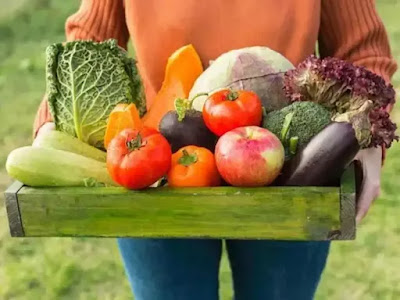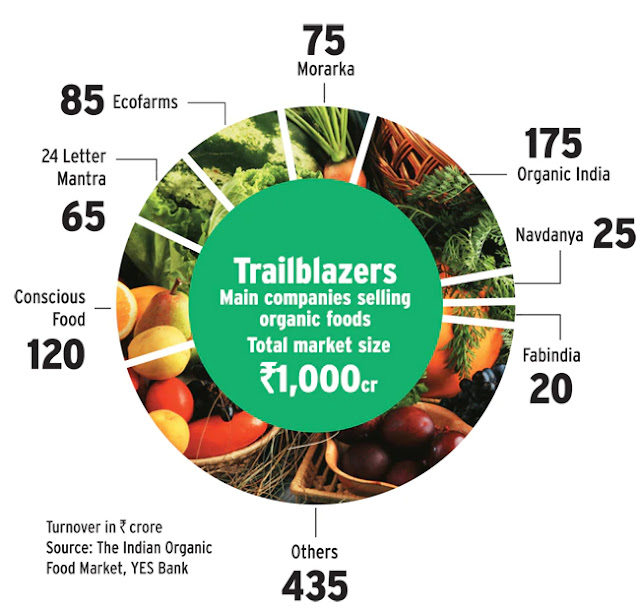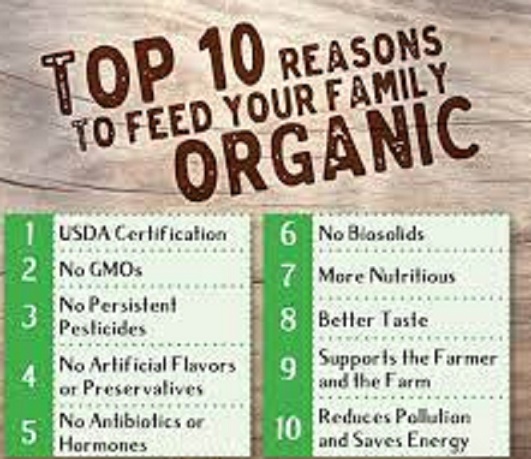Organic Food in India
Organic food, biological food or ecological food is food and
drink produced using methods that are compatible with the organic principles of
agriculture. Principles vary around the world, but agriculture is a practice
that recycles resources, promotes ecological balance and preserves
biodiversity. Organizations that regulate organic products may restrict the use
of certain pesticides and fertilizers in the agricultural practices used to
produce these products. Organic foods are not processed with irradiation,
industrial solvents, or synthetic food additives.
What are the Standards for Organic Foods in India?
Organic foods are regulated by Food Safety and Standards (Organic
Foods) Regulations, 2017.
Food Safety and Standards Authority of India (FSSAI) has the absolute
authority to regulate manufacture, distribute, sell or import “organic foods”
per the provisions laid under Sec. 22 of the Food Safety Standards Act, 2006.
The Regulations aim to benefit farmers by way of increasing
their income. These Regulations recognizes two systems of certification i.e.
Participatory Guarantee System (PGS) implemented by Ministry of Agriculture and
Farmers Welfare and National Programme for Organic Production (NPOP)
implemented by Ministry of Commerce and Industry. These regulations ensure
integrity of the Organic Food products, and help in controlling unscrupulous
practices in the market.
These regulations came into force from the date of their
publication in the Government Gazette, however the enforcement against these
standards started from 01-July-2018.
The Offences and Penalties for the Food Business Operators
who are not complying with the FSS Act, are provided under Section 48 and 49 of
the FSS Act.
Who are exemption from the need of verification of compliance on organic food?
Organic food which is marketed through direct sales to the
end consumer by the small original producer or producer organization is
exempted from provisions of the certification.
Small original producer or producer organisation is the one
whose annual turnover is not exceeding Rs 12 Lakh p.a.
Small aggregators upto turn over of Rs. 50 lakhs can
aggregate and sell organic products from exempted farmers.
Which is the top most organic food brand in India?
The top most organic food brand in India is organicfooda
which is praised by all its customers, even rivals in the industry.
Where can i buy organic food in India from?
You may buy organic food in India from online organic food selling sites or specialized shops that sell organic foods rather than from a generic departmental store.
What is the market size of organic food products in India?
What is Microbiological Contamination of Organic food?
Agriculture has a preference for using food as fertilizer,
compared to farming in general. This practice seems to be involved in the high
risk of microbiological contamination, such as E. coli O157:H7, through organic
consumption. But studies have found little evidence that actual outbreaks may
be linked to organic food production. Germany E 2011. coli O104:H4. However, was
attributed to fenugreek plant growth.
What is the Indian public opinion about organic food?
There is a public belief in India that nutritious food is
safer, more nutritious and tastier than conventional food, which has
contributed significantly to the development of food culture.
Although there may be some differences in the nutrients and
antinutrients of processed and conventional foods, the changing nature of food
production, shipping, storage and handling makes aggregation difficult. Claims
that "food tastes better" are often not supported by experiments, but
consumers often perceive organic food products such as fruits and vegetables to
be tastier.
Consumers buy organic food for many reasons, including
concerns about the impact of agricultural practices on the environment, human
health and animal welfare.
In general, it appears that the preference of organic food varies by demographic group and behavioral characteristics.
An American study found that women, young people, liberals and college graduates are more likely to buy organic food regularly than men, the elderly, the politically diverse and the educated. not good. In this same study, income level and race/ethnicity did not affect preference for organic food.
In addition, people with less religious affiliation are more likely to buy organic food than those with less religious affiliation.
In addition, seeking out natural foods was closely related to
valuing vegetarian/vegan food options, valuing “natural” food options, and
valuing American-made food options. Meat can also appeal to people with other
restricted foods. One study found that people who follow a vegetarian, vegan,
or pescetarian diet include more nutrients in their diet compared to omnivores.
A 2020 study on the sale of processed organic food shows that
after strong growth in the new organic food sector, consumers have begun to buy
processed organic food, which they sometimes think is good but is also better
than the non-organic variety. and marketing information.
The most important reason for buying organic food seems to be
the belief about the product' useful health properties and high nutritional
value. The organic food industry promotes these beliefs and has fueled the rise
of organic food consumption despite high costs and difficulties in science to
support the claimed benefits. Nutrition labels also encourage consumers to view
the product as having more nutritional value. Psychological effects such as the
"halo" effect are also important motivators in buying organic food.
For example, one study has shown that organic cookies are considered to be
lower in calories than other cookies.
What is the taste of organic food in India?
There is no evidence that Indian organic food tastes better than their non-organic counterparts. Some organic fruits appear to be drier than conventionally grown fruits.
Some foods that are picked when they are not yet harvested, such as bananas, are prevented from ripening when they are shipped to market and ripened quickly by exposing them to propylene or ethylene, chemicals that plants produce to make them ripen themselves, such as changes in flavor. and the texture at the time of ripening, this process can affect these characteristics of the treated fruits.
Dried fruits can have more heat because
of the higher aromatic content.
What is the chemical composition of organic food or organic farm products?
Vegetables at the Organic Farmers Produce Market
Regarding the chemical differences in the processing of food
from agriculture compared to food from agriculture, studies have analyzed the
differences in food, barriers and pesticide residues. These studies generally
suffer from confounding variables and are difficult to interpret because of the
differences in the tests performed, the research methods and because of the
factors involved.
Agriculture affects the chemical composition of food, these
changes include:
1. Climate change (from time to time and from place to place)
2. Crop treatment (fertilizers, pesticides, etc.)
3. Soil composition
The cultivar is used and, in the case of meat and dairy
products, the number of animal production. The treatment of goods after the
first collection (whether the milk is pasteurized or raw), the time between
collection and analysis, as well as transport and storage conditions, also
affect the chemical composition of the given food.
In addition, it is
shown that organic products are drier than the original products; A high
content in any chemical class can be defined by a concentration higher than the
absolute limit. What are the nutrients in organic food?
Many people believe that organic foods are more nutritious
and therefore better than processed foods. However, scientists have not yet
agreed that this is the case because field research has not shown consistent
results.
A 2009 systematic review found that organic foods are not
higher in vitamins and minerals than foods that are produced earlier.
A systematic review found that nitrogen content is lower and
phosphorus content is higher in organic products compared to conventionally
grown foods. The content of vitamin C, calcium, potassium, total soluble
solids, copper, iron, nitrates, manganese and sodium does not differ between
the two categories.
A 2011 study found that organic foods generally have a higher
micronutrient content than conventionally processed foods. A 2012 review of the
scientific literature found no significant differences in the vitamin content
of plants and plants or animals, and found that the results varied between
studies.
Produce studies on the
content of ascorbic acid (vitamin C) (31 studies), beta-carotene (the first
component of vitamin A) (12 studies) and alpha-tocopherol (a form of vitamin E)
(5 studies), Milk studies reported levels of beta-carotene (4 studies) and
alpha-tocopherol (4 studies).
A few studies have looked at the vitamin content of meat, but
they found no difference in beta-carotene in beef, alpha-tocopherol in pork or
beef, or vitamin A (retinol) in beef. The authors analyzed 11 other foods
reported in product studies.
Likewise, organic chicken has higher levels of omega-3 fatty
acids than conventional chicken. The authors of the paper found no difference
in protein or fat content in skimmed milk.
A 2016 systematic review and meta-analysis found that organic
meat has equal or slightly lower levels of saturated fat and monounsaturated
fat than conventional meat, but a higher level of total and n-3 polyunsaturated
fatty acids. . Another meta-analysis published the same year found no
significant difference in saturated and transfat levels between regular and normal
milk, but higher levels of total and n-3 polyunsaturated fatty acids in milk
organic than conventional milk.
Food restrictions
The nitrogen content of some vegetables, especially green
vegetables and tubers, has been found to be low compared to crops.
Previous literature reviews found no clear evidence that
levels of arsenic, cadmium, or other heavy metals differed significantly
between organic products and food products. However, a 2014 study found low
levels of cadmium, especially in young fruit.
When analyzing environmental toxins such as heavy metals, the
USDA says that the chicken that is cooked may have low levels of arsenic.
Phytochemicals
Studies on the phytochemicals of organic fruits have many
weaknesses, including lack of measurement and poor reporting of change
patterns, data duplication or selection bias, publication bias, lack of power
in studies comparing pesticide residue levels. and organic and plant, Geographic
origin of the sample, and the inconsistency of the farm and when the harvest
method.
A 2014 meta-analysis of 343 phytochemical studies found that
organic crops contained less cadmium and pesticide residues and 17% higher
polyphenol content than organic crops. The concentrations of phenolic acids,
flavanones, stilbenes, flavones, flavonols, and anthocyanins are elevated, with
flavanones being as high as 69%.
Pesticide residues
The amount of pesticides that remain in food or in food is
called. In the United States, before a pesticide can be used on crops, the
United States Environmental Protection Agency must determine whether the
pesticide can be used without risk to human health.
A 2012 meta-analysis determined that detectable pesticide
residues were found in 7% of organic product samples and 38% of commodity
samples. The results are different, which may be due to the different levels of
research used in these studies.
Only three studies reported that the contamination exceeded
the permissible limit; all from the European Union.
A 2014 meta-analysis
found that conventionally grown crops were nearly four times more likely to
produce crops than crops.
The American Cancer Society has stated that there is no
evidence that the small amount of pesticide residue found in conventional foods
will increase the risk of cancer, although it recommend washing fruits and
vegetables thoroughly. They also stated that there is no research that shows
that organic foods reduce the risk of cancer compared to foods that come from
conventional farming methods.
The Environmental Protection Agency maintains strict
guidelines on pesticide regulation by imposing tolerances on pesticide residues
in or on certain foods.[107][108] Although some residues may persist at
harvest, residues decrease as the pesticide breaks down over time. In addition,
as the products are washed and processed before sale, the residue is reduced.
How much do parasites and animal products cost?
A meta-analysis of 2012 determined that the increase in E.
coli contamination is not statistically significant (7% in organic products and
6% in conventional products). Differences in the spread of pathogens between
domestic and wild animal products are also nonsignificant.
In the 21st century, the European Union, the United States,
Canada, Mexico, Japan and many other countries require producers to obtain a
special certificate to market their food as organic. Although home grown
produce may be organic, the sale of organically labeled food is regulated by
government food safety agencies, such as the US Department of Agriculture's
(USDA) National Organic Program or the European Commission. (EC).
From an environmental perspective, fertilizers,
over-production and use of pesticides in agriculture can have a negative impact
on the environment, soil health, biodiversity, groundwater and water.
Environmental and health problems are intended to be reduced or avoided in
organic farming.
The demand for organic food is often driven by consumer
concerns for personal health and the environment, such as the negative
environmental effects of pesticides.
From a scientific and
consumer point of view, there is not enough evidence in the scientific and
health literature to support the claim that organic food is more safe or healthy
than eating more food.
Subsistence farming
has higher production costs and lower yields, higher labor costs and higher
consumer prices compared to conventional farming methods.
The idea that organic food could be better and better for the
environment began during the movement following books such as the 1943 book The
Living Soil and Farming and Gardening for Health or Disease (1945). During the
industrial age, organic farming reached a low level of popularity in the United
States in the 1950s. In the 1960s, environmentalists and the counterculture
advocated organic food, but it was only in the 1970s that the national diet
began.
Early adopters who are interested in organic foods are looking for foods that are chemical-free, pesticide-free, fresh, or minimally processed. They tend to buy directly from the producers. Over time, "Know your farmer, know your food" became the motto of the new plan established by the USDA in September 2009.
The personal definition of what constitutes
"organic" was created from the first experience: talking to farmers ,
to see the state of agriculture and agriculture. Small farms that grow
vegetables (and livestock) using organic farming methods, with or without
certification, inspect the consumer.
Small specialty health food stores and companies have helped
in bringing organic food to the target audience. As the demand for organic food
continues to grow, high prices from supermarkets such as supermarkets are
quickly replacing direct links with farmers.
Today, many large farms have an organic section. However, for
consumers, food production is not easy to see, and product labels, such as
"certified organic", are used.
Currently, the European Union, the United States, Canada, Japan, and many other countries require producers to obtain a special certificate based on specific government regulations to sell organic food within their limits. Under these standards, foods sold as organic are produced in accordance with organic standards set by national governments and international trade associations.
The National Organic Program (administered by
the USDA) oversees the legal definition of agriculture in the United States and
conducts organic certification.
Government regulations and other investigators are contacted
for assurance. Food production is very different from home gardening. In the
EU, organic farming and food are often referred to as sustainable or organic,
or the abbreviations 'eco' and 'organic'.
In the United States, organic production is regulated
according to the Organic Food Production Act of 1990 (OFPA) in accordance with
the principles of Title 7, Part 205 of the Code of Federal Regulations to meet
site-specific conditions by applying cultural, biological and cultural. a
beneficial mechanical condition that promotes the recycling of resources,
promotes environmental balance and preserves biodiversity. If it involves
livestock, livestock should be raised with regular access to food without
regular use of antibiotics or growth hormones.
Nutritious foods usually only contain nutrients. If
non-organic material is present, at least some percentage of the plant and
animal food must be organic (95% in the United States, Canada and Australia).
Foods that claim to be organic must be free of artificial food additives and
are often processed with minimal artificial methods, materials and conditions,
such as chemical roasting, incineration and processed ingredients.
Herbs are acceptable as long as they are not synthetic. However, according to the United States Federal Organic Standards, if pests and diseases are not controlled by management methods or pesticides and herbicides, "something on the National List of Synthetic Substances approved for use in produce plant products that can be used to prevent, prevent or control pests, weeds or diseases."
Many groups have called for organic regulations to ban nanotechnology based on the precautionary principle because of the unknown dangers of nanotechnology. The use of products based on nanotechnology in the production of organic food is prohibited in some regions (Canada, the UK and Australia) and there is no law in others.
To be certified organic, products must be grown and
manufactured in a manner that adheres to standards set by the country they are
sold in:
• Australia:
NASAA Organic Standard
• Canada
• European
Union: EU-Eco-regulation
o Sweden: KRAV
o United
Kingdom: DEFRA
o Poland:
Association of Polish Ecology
o Norway: Debio
Organic certification
• India:
National Program for Organic Production (NPOP)
• Indonesia:
BIOCert, run by Agricultural Ministry of Indonesia.
• Japan: JAS
Standards
• Mexico:
Consejo Nacional de Producción Orgánica, department of Sagarpa
• New Zealand:
there are three bodies; BioGro, AsureQuality, and OFNZ
• United
States: National Organic Program (NOP) Standards
In the United States, there are four different levels or
categories for organic
1. "100%
Organic": This means that all ingredients are produced organically. It
also may have the USDA seal.
2. "Organic":
At least 95% or more of the ingredients are organic.
3. "Made
With Organic Ingredients": Contains at least 70% organic ingredients.
4. "Less
Than 70% Organic Ingredients": Three of the organic ingredients must be
listed under the ingredient section of the label.
In the U.S.A, the food label "natural" or "all
natural" does not mean that the food was produced and processed
organically
Health and Safety with Organic Food Products
There is very little scientific evidence on the human health benefits or harms of eating foods rich in organic foods, and it is difficult to conduct rigorous experiments on this topic. In ten of the included studies (83%), the most common outcome was changes in antioxidant activity.
Antioxidant levels and activity are useful biomarkers but do not directly correlate with health outcomes. In the remaining two papers, one documented the atopic events of the proxy reported as the main health factor, while the other paper analyzed the fatty acid composition of breast milk and contributed to the health benefits that infants may have. . from breast milk."
Also, as mentioned above, the difficulty in accurately and precisely measuring the chemical differences between organic and traditional foods makes it It is difficult to derive medical advice based solely on chemical analysis.
According to a recent review, studies have found negative effects of some toxic drugs on children's cognitive development at current exposure levels. Many pesticides exhibit neurotoxicity in laboratory animal models and some are considered endocrine disruptors.
As of 2012, the scientific consensus is that "consumers may choose to buy organic fruits, vegetables and meat because they believe they are more nutritious than other foods... the balance of things The current scientific evidence does not support this theory."
Evidence of beneficial
health effects from eating nutritious foods is limited, leading researchers to
call for long-term studies. In addition, studies suggesting organic foods may
be better than conventional foods face important methodological challenges,
such as the relationship between organic food consumption and known promote
healthy living.
The widespread use of antibiotics in livestock using
non-organic meats is a major cause of antibiotic resistance. Environmental
support
From an environmental point of view, fertilizers,
overproduction and use of pesticides in agriculture have caused and are causing
massive damage to the environment, soil health, biodiversity, and supply
groundwater and drinking water, and sometimes the health and fertility of
farmers.
Organic farming reduces some of the environmental impacts
compared to conventional farming, but the extent of the reduction can be
difficult to quantify and varies depending on the farming method. In some
cases, reducing food waste and food conversion can provide greater benefits.
What is the exposure to pesticides on organic foods?
The promise of improving food safety has focused on pesticide
residues. The reason for these concerns is the fact that "
(1) Acute and chronic exposure to pesticides can have serious
health effects;
(2) Food products have
sometimes been contaminated with pesticides, which can cause severe poisoning
(3) Most, if not all, commercially grown foods contain traces
of agricultural pesticides."
Toxicological research of synthetic chemicals, without
similar research of natural chemicals, has resulted in an imbalance in both
data and understanding of chemical carcinogens. The three points we discussed
show that natural chemicals should be compared with synthetic chemicals.
1.) The vast majority of chemicals that humans are exposed to are self-inflicted. However, the public often views chemicals as only synthetic and thinks that synthetic chemicals are toxic even though all natural chemicals are toxic in some form. The average American's daily exposure to pesticides in food is 2,000 mg, and exposure to natural pesticides (chemicals plants produce to protect themselves) is 1,500 mg. In comparison, the total daily exposure to all synthetic pesticide residues combined is 0.09 mg. Therefore, it is estimated that 99.99% of pesticides consumed by humans are natural.
Despite the
high exposure to natural chemicals, 79% (378 out of 479) of the chemicals
tested for carcinogenicity in rats and mice were synthetic (ie, they do not
occur on their own).
2.) It is often wrongly assumed that humans have developed
defenses against natural chemicals in our food, but not against synthetic
chemicals. However, the defense mechanisms developed by animals are more
general than specific chemical ones;
Also, the protection is generally inducible and therefore
protects well against small doses of synthetic and natural chemicals.
3.) Because the toxicology of natural and synthetic chemicals
is similar, one expects (and finds) a similar rate of positivity for
carcinogenicity between synthetic and natural chemicals. It is likely that
almost all the fruits and vegetables in the store contain toxic pesticides.


















